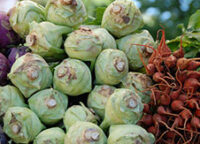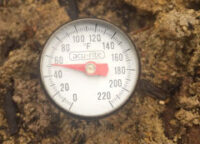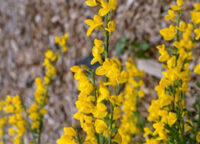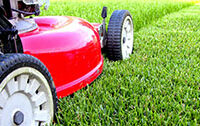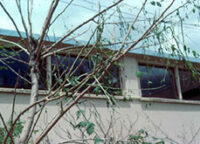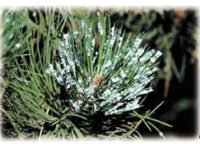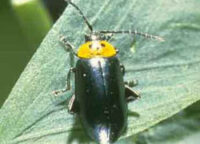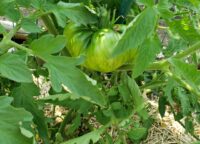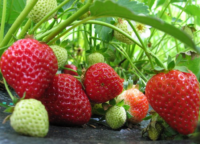- 02, 10, 2017
- Comments Off on 1843 – Early Vegetable Planting and Soil Preparation
- By cwis672
1843 – Early Vegetable Planting and Soil Preparation
If a cold-frame isn’t available to start early greens, wait until soil temperatures have warmed to 40 degrees F at a depth of 4 inches at 8 a.m. Soil temperatures recorded at the CSU campus weather station over the last five years show that soil typically reaches this temperature during the last few days of March. […]
Take a Tour- 02, 03, 2017
- Comments Off on 1626 – Soil Temperatures, Frosts and Planting Dates
- By cwis672
1626 – Soil Temperatures, Frosts and Planting Dates
Adapted by Deryn Davidson from the CO-Horts blog originally authored by Eric Hammond, CSU Extension Adams County When is the right time to plant vegetables? Appropriate planting times for vegetables are based on both air and soil temperatures. Air temperature is fairly straightforward. While cool season crops will tolerate varying degrees of cold weather, most […]
Take a Tour- 02, 02, 2017
- Comments Off on 2019 – Plant Select® 2000
- By cwis672
2019 – Plant Select® 2000
Since the spring of 1997, regional gardeners have embraced the Plant Select® program. Each year, the program introduces gardeners to plants suitable for Colorado, and makes specific recommendations for their use. Plant Select®, in the year 2000, features five exceptional plants that continue the program’s standard of excellence for superior performance in gardens from […]
Take a Tour- 02, 02, 2017
- Comments Off on 1561 – The Truth About Roundup Resistant Turf
- By cwis672
1561 – The Truth About Roundup Resistant Turf
Adapted by Alison O’Connor, Larimer County Extension, from the CO-Horts blog originally authored by Tony Koski, CSU Extension Turf Specialist What is a GMO? The acronym “GMO” (genetically modified organism) can be heard or read daily in the news. A great deal of the debate revolves around potential health effects that GM plants and animals […]
Take a Tour- 01, 26, 2017
- Comments Off on 2014 – Hail Damage
- By cwis672
2014 – Hail Damage
2014Hail Damage Hail can be devastating for a Colorado garden. Damage can range from a few bruised leaves to a total wipeout of all foliage. However, plants want to grow, so with time and some extra care, lots of them will recover. Flowering annuals with no remaining foliage probably won’t recover after a hailstorm. Petunias […]
Take a Tour- 11, 21, 2016
- Comments Off on 1499d – Mosquitoes and Rainstorms and Hail, Oh, My!
- By cwis672
1499d – Mosquitoes and Rainstorms and Hail, Oh, My!
Adapted by Deryn Davidson from the CO-Horts blog originally authored by Carol O’Meara, CSU Extension Boulder County During years with heavy rains, a gardener’s yard is filled with opportunities for mosquitoes to lay their eggs. To reduce the risk, change bird bath water twice per week; dump out water that collects in the dish beneath pots; […]
Take a Tour- 10, 28, 2016
- Comments Off on 1458 – Psyllids
- By cwis672
1458 – Psyllids
What are psyllids? Psyllids are small but devastating insects for gardeners growing tomatoes or potatoes. The insect causes tomato fruit to stop forming or ripening, and many small potato tubers to develop and sprout prematurely before harvest. How do I know my plants have psyllids? The mid-veins and edges of leaves on the tops of […]
Take a Tour- 10, 28, 2016
- Comments Off on 1446 – Flea Beetles on Vegetables
- By cwis672
1446 – Flea Beetles on Vegetables
What crops do flea beetles attack? There are several flea beetle species in Colorado. These beetles commonly attack vegetable plants including tomatoes, potatoes, peppers, eggplant, cabbage, broccoli, beans, radishes, beets and lettuce. What do flea beetles look like? Adult flea beetles are small and shiny. When disturbed, they jump. The western cabbage flea beetle, pale-striped […]
Take a Tour- 10, 24, 2016
- Comments Off on 1817 – Tomatoes for Home Gardens
- By cwis672
1817 – Tomatoes for Home Gardens
Tomatoes are one of the most popular garden vegetables. Many different tomato types, varieties and shapes are available for gardening. How should I start a tomato plant? Tomatoes do best if started indoors from seed six to eight weeks before planting. For an early crop, plant tomatoes as soon as the danger of frost is […]
Take a Tour- 10, 17, 2016
- Comments Off on 1208 – Strawberries
- By cwis672
1208 – Strawberries
What are the different types of strawberry plants? Strawberry plants are either June-bearers, ever-bearers or day-neutrals, depending on when the fruit is produced. June-bearers fruit over several weeks in the spring, usually in June. Guardian and Honeoye are good June-bearing varieties. Ever-bearers have two major fruiting cycles with additional limited fruit production throughout the growing […]
Take a Tour
